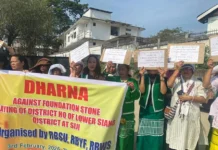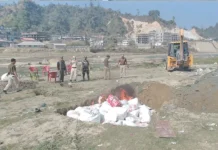NEW DELHI, 14 Sep: The Indian Journalists Union (IJU) has condemned the arrest of Debmalya Bagchi, a correspondent of the Anandabazar Patrika, in West Bengal’s Kharagpur on 6 September on charges of ‘assaulting his neighbour, a Dalit woman.’
However, journalists in the state suspect that the arrest is linked to his recent articles highlighting hooch traders, including the neighbour, operating from Sanjol residential area.
According to the police, Bagchi’s neighbour filed a complaint that, in the evening of 27 August, she and her in-laws were outside their home when he allegedly hurled abusive and casteist remarks at them. And when they protested, Bagchi assaulted her. The police booked Bagchi and one Basanti Das under IPC Sections 341 (wrongful restraint), 323 (voluntarily causing hurt), 354 B (assault or use of criminal force with intent to disrobe), 509 (uttering any word or making any gesture intended to insult modesty of a woman), and under provisions of the SC & ST (Prevention of Atrocities) Act.
While the Anandabazar Patrika has chosen to remain silent on the issue, it had carried a series of articles on the illegal hooch business by Bagchi, saying that the local administration was indifferent towards the issue, and that those involved in the trade had gheraoed homes of people who had complained against them.
On being approached by journalists about the unfair arrest, Chief Minister Mamata Banerjee had assured that she would look into the case, but nothing has been done till now.
In a statement, IJU President Geetartha Pathak and Secretary-General Sabina Inderjit said that Bagchi’s arrest “is an assault on the freedom of the press, as it is intended to harass him for his articles on the illegal hooch trade. Instead of going after the culprit traders, the police action was shooting the messenger.”
The IJU demanded Bagchi’s immediate release, and urged the TMC government to “refrain from harassing and intimidating the media through such actions, and let it carry out its responsibility of informing the citizens, vital to any democratic society.”



